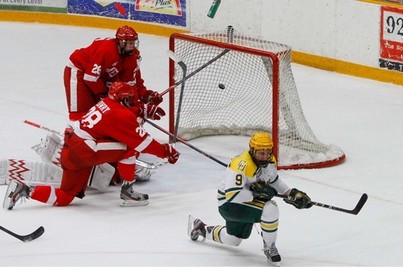This writer predicted that it would be apparent early during Friday's game if Coach Schafer managed to get through to his players after often hapless efforts in the Capital District. I stand by that prediction. Ben Sexton from Clarkson put the puck in the net for the Golden Knights a mere 45 seconds into the opening frame. The message was not sent; or at the very least, it was not received.
Andy Iles was called on many times in the first period to make spectacular saves to keep Clarkson's lead to one goal after letting one slip by early. Cornell escaped the first period, but it was Clarkson that was still buzzing. Shots on goal are not always a barometer of the flow of play, but the seven-to-two differential in favor of Clarkson captured the apparent angle of the ice.
Cornell came out and looked slightly better in the second period. However, it was the Big Red that would allow again the first goal of that frame. Just over five minutes into the frame, Allan McPherson (remember that name), gave Clarkson a two-goal lead. It was at that moment that Cornell appeared to wake up and realize that it was in a position to lose this game. It was in a position to suffer a zero-point weekend. It was at that moment that Cornell began to play well. The switch flipped after 25:09 had expired.
Clarkson was caught in its own end for long segments of time and the Golden Knights began to have difficulty penetrating the neutral zone. Cornell's chances were not great, but line changes began to become a challenge for Clarkson as it was often caught in its own end. Clarkson needed to resort to icing the puck to gain a respite several times in the second and third periods. It took only five and a half minutes before Cornell struck.
Clarkson was whistled for a penalty at 9:54 of the second period. Casey Jones's Golden Knights shut down Cornell on its first power-play chance. The best power-play unit in the nation looked impotent against the penalty killing of Clarkson on Cornell's first chance. It changed when Dustin Mowrey unleashed a shot from near the point that John McCarron muscled past Clarkson's Greg Lewis down low to begin Cornell's rally.
Casey Jones must be a strict adherent to the principles of Schafer because when the third period began, it was apparent that Clarkson was content to defend its 2-1 advantage. Cornell did not take its foot off the accelerator. Clarkson needed to rely upon delaying tactics to catch its collective breath. The first five minutes of the third period saw Cornell squander another power-play opportunity to even the score. It would not be its last of the period.
The opening for Cornell came at the 12:09 mark of the third period. Cornell wasted no time. Cornell rushed back into the zone. Lowry, for a point on his birthday, and Ryan connected with Ferlin to knot the game. It seemed that Cornell was headed for a guaranteed point. A victory seemed likely. The pressure that Cornell maintained made it seem that a regulation victory was within ready reach.
Clarkson of course began to fight back, but it was Cornell that still controlled the game. In the final 7:23 after Cornell tallied the tying goal, Clarkson mounted only two threatening rushes. The second proved fatal.
The Golden Knights got deep pressure against Iles and forced Cornell on its heels. A scrum in front of the net led to at least three shots from the Golden Knights. Cornell assembled in front of the net, screening Iles, but never finding the clearing shot to arrest the onslaught. Unchallenged, Allan McPherson (remember him?) shot, collected his own rebound, and found an empty third of the net with Iles committed to the right post. Cornell challenged admirably in the last 37 seconds. However, sluggish play and a momentary lapse had done all the damage that was necessary to give Clarkson the victory.
Cornell delivered a high-end and disciplined effort for 34:14 minutes of a 60-minute contest against Clarkson. This included rallying against a stalwart defense and top-end goaltender. The promise is apparent, but the lack of consistency and the drop-off in efficacy when Cornell is not clicking on all cylinders proves ominous. Schafer stated that a lack of fire and implied apathy was why Cornell could not close out Clarkson and why the Big Red has delivered less than complete efforts against Quinnipiac, RPI, and Union before it. In a post-game interview, Schafer stated it was on him to get the team ready to compete the next evening.
Where Coach Schafer appeared to have failed the week before, he seemed to have struck the right chord the evening between the Clarkson and St. Lawrence contests. Both Cornell and St. Lawrence needed a win desperately. Cornell was winless in four outings. St. Lawrence had fallen in its first contest in weeks at proud Appleton.
Cornell made sure early to control the pace of the game. The Big Red would not spot St. Lawrence a lead like it had Clarkson. It was Cornell's power play, a unit that would become the top-ranked power-play unit in the country before weekend's end, that gave Cornell a lead that it would not relinquish. St. Lawrence took to killing a penalty at 4:21 of the first period.
The Saints got a few clears and challenged Cornell foolishly deep in the Red's end. Cornell did not have much zone time, but once it set up in the Saints's end. It was mere moments later that Ryan and Ferlin connected with Lowry to give the lattermost his birthday goal a day late.
St. Lawrence's power play evened the goal as one of the Brothers Carey bested Andy Iles on the power play. Greg Carey, a Hobey Baker Award hopeful, according to some, taunted The Captain from Cornell as the elder McCarron left the penalty box. Unwise choice. The Captain appeared driven by fire. John McCarron assisted on Joel Lowry's second goal of the contest. Lowry's blast was from the right face-off circle and beat Weninger glove side.
Cornell's strike was again on the power play. The game was even for a brief 44 seconds. The Saints got the message. Dustin Mowrey contributed a second assist on Brian Ferlin's first goal of the contest. Ferlin corralled passes from his teammates on a bad turnover from the Saints. Ferlin put it in the back of the net. Greg Carvel switched his netminder.
John McCarron gave Tyler Parks, the back-up netminder, a warm welcome to the contest less than four minutes later. The three-goal, 4-1 lead at the close of the first period proved insurmountable for the Saints. What happened next was disappointing. Cornell took its foot off the gas.
Predictably, the defense saw Cornell's attempt to retreat into a defensive shell and dare St. Lawrence to make it a game again. Cornell at its best does this with uncanny ease. However, at one moment, Cornell was far from at its best.
Sloppy stick-handling from Cornell defensemen in front of Iles led to a horrible turnover down low that put Sean McGovern of St. Lawrence on Iles's doorstep. With little space or time in which to navigate, McGovern bested Iles for his first collegiate goal. The goal was a quick reminder for this Cornell team how quickly even a minor mistake can ruin a solid effort.
Ferlin would tally a second goal of the evening that put the game in the win column even though 1:53 remained in the contest. The final margin of victory was 5-2. The take-away messages from both contests are the same despite the differing results.
When this team plays with fire and intensity, its efforts are enough to take down the most talented teams in the nation and in ECAC Hockey. When this team even allows a slip of discipline or encroachment of apathy into its game, the level of the team plummets to a level uncharacteristic of even poor Cornell teams allowing opponents to convert in record time. No effort will be perfect, but the trend this season is that when Cornell errs, it errs with conviction. These errors have been almost team-wide and systemic collapses, rather than individual collapses, that allow for easy goals like the last goals allowed against Clarkson and St. Lawrence over the weekend.
Coach Schafer was concerned with lack of "fire" after the game against Clarkson. It came back against St. Lawrence. However, the question remains how long will the fire remain stoked? Moments of malaise plague the team and seem capable of downing even its best efforts. The margin of error with this Cornell team is smaller than it has been with most.
Recognition is in order for some of Cornell's most talented players who showed up in a huge way on Saturday. Brian Ferlin, Joel Lowry, and Dustin Mowrey had three-point efforts against St. Lawrence. The Captain did his part with two points. Eight Cornellians recorded points also including Kubiak, MacDonald, Ryan, and Willcox. A balanced attack downed the Saints.
While the return efforts of some that have been sorely missed over the four-game winless drought, players like Dustin Mowrey and Joakim Ryan have contributed mightily, even in ties and losses. Armand de Swardt had a great game against Clarkson on Friday night. De Swardt generated zone time and even challenged on a few key scoring opportunities.
Clarkson and St. Lawrence had few high-quality scoring chances. Most opportunities were from the outside and up the ice. The exceptions in the first contest were the first and last Clarkson goal while in the second contest it was St. Lawrence's second tally. However, this all is generally reassuring.
The four-goal total in one period for Cornell was the most a Cornell team has scored in one period since Cornell scored four goals against Clarkson at Lynah Rink in January 2010. The most memorable recent game in which Cornell scored four goals in one period occurred in November 2009 when the Big Red rallied to dominate the Crimson at Lynah Rink. The feat should be neither over- nor under-stated. If Cornell continues to play with passion, then it is a great benchmark of what can be. If Cornell dapples in indifference, then it will become a painful remainder each time it falters of what could have been.
Cornell returns to Lynah Rink bringing with it the most lethal power-play unit in the nation. The Big Red have left unanswered if it is among the best in the nation. It is a wide-open question. Cornell has shown glimmers of greatness, but until it can produce sustained success this season it is not sufficient to take solace in popular perceptions informed by the long historical coattails of Cornell hockey.
As Cornell's trip through the North Country comes to a close, this season's Cornell hockey program should heed the advice of legendary St. Lawrence coach Joe Marsh. Marsh stated that "tradition is not something you really can rely on. It is something that you have to build on." This Cornell teams needs to build off of this weekend. It is then that it can begin to worry if it can add to the proud tradition of Cornell hockey.
This Cornell team has had moments of greatness already, but only sustained success can prove it is a truly great team.




 RSS Feed
RSS Feed
